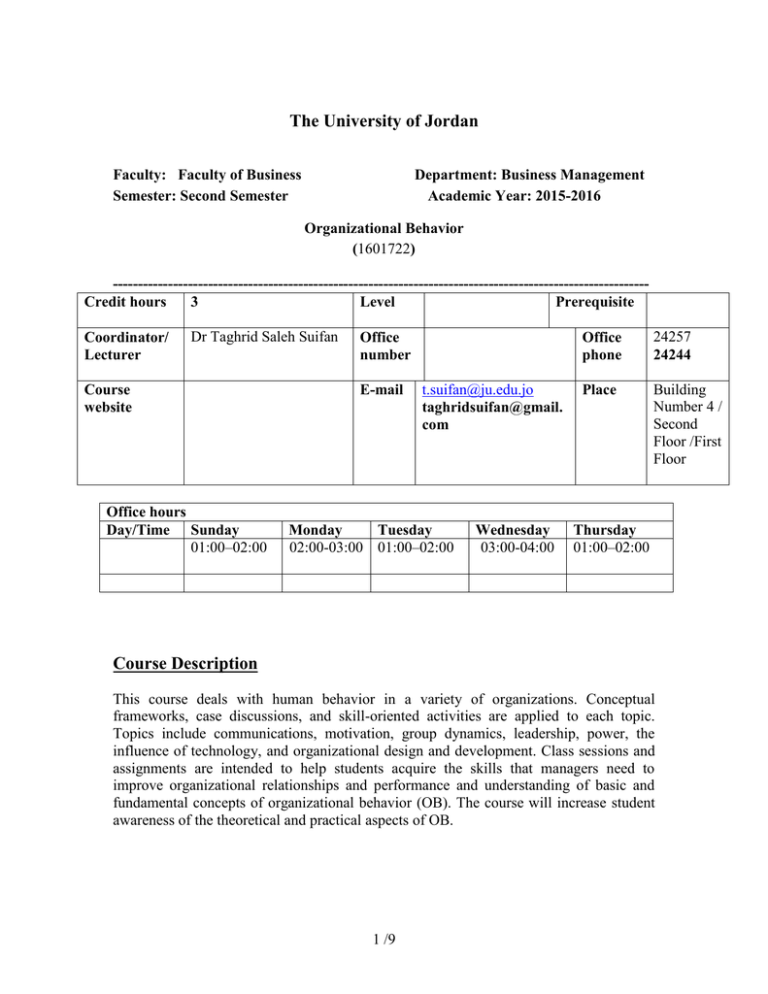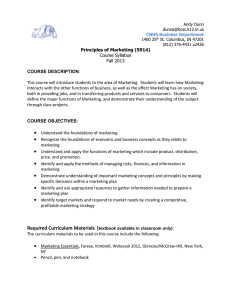
The University of Jordan
Faculty: Faculty of Business
Semester: Second Semester
Department: Business Management
Academic Year: 2015-2016
Organizational Behavior
(1601722)
----------------------------------------------------------------------------------------------------------Credit hours
3
Level
Prerequisite
Coordinator/
Lecturer
Dr Taghrid Saleh Suifan
Course
website
Office hours
Day/Time Sunday
01:00–02:00
Office
number
E-mail
t.suifan@ju.edu.jo
taghridsuifan@gmail.
com
Monday
Tuesday
02:00-03:00 01:00–02:00
Wednesday
03:00-04:00
Office
phone
24257
24244
Place
Building
Number 4 /
Second
Floor /First
Floor
Thursday
01:00–02:00
Course Description
This course deals with human behavior in a variety of organizations. Conceptual
frameworks, case discussions, and skill-oriented activities are applied to each topic.
Topics include communications, motivation, group dynamics, leadership, power, the
influence of technology, and organizational design and development. Class sessions and
assignments are intended to help students acquire the skills that managers need to
improve organizational relationships and performance and understanding of basic and
fundamental concepts of organizational behavior (OB). The course will increase student
awareness of the theoretical and practical aspects of OB.
1 /9
Learning Objectives
i) Understand the basic fundamental concepts of organizational behavior and its
application in managing people
ii) Apply the different approaches to organizational behavior and enhance the
human relationships within the organization.
iii) Explore the relationships among the various components of organizational
behavior and their effectiveness.
Intended Learning Outcomes (ILOs):
Successful completion of the course should lead to the following outcomes:
A. Knowledge and Understanding: students are expected to
Be provided with a conceptual framework for understanding human work behavior in
the organizational setting.
Describe systematically how people behave under variety of conditions, to
understand why people behave as they do, to predict future employee behaviour
and to control & develop human activity at work.
B. Intellectual Analytical and Cognitive Skills: Student are expected to
Acquire the skills that managers need to improve organizational relationships and
performance and understanding of basic and fundamental concepts of
organizational behavior.
Increase their awareness of the theoretical and practical aspects of OB.
Know the challenges faced by today’s organizations.
Deal with today’s workforce.
Demonstrate the competencies needed by effective managers.
Understand the importance of effective organizational behavior.
C. Subject- Specific Skills: Students are expected to
Improve their ability to think analytically, systematically, and critically about
various aspects of how managers can utilize principles of organizational behavior.
Improve their ability to analyze and understand organizational situations in terms
of OB theories and concepts.
Improve their skills in reacting appropriately to organizational situations using
OB concepts.
Improve their ability to create and maintain healthy and productive work
environments.
2 /9
D. Transferable Key Skills: Students are expected to
Identify key theoretical aspects and practical applications of organizational
behavior.
Apply OB concepts and theories to analyze and improve work situations.
Understand and leverage their traits and OB competencies in the workplace for
professional success and as a potential organizational leader.
ILOs: Learning and Evaluation Methods
ILO/s
Learning Methods
Evaluation Methods
Lectures and Discussions
Critical Review Articles
Individual Assignments
Group Projects
Presentation
Exam, Quiz,
presentation,
project
assignments
3 /9
Course Contents
Content
Reference Week
ILO/s
Orientation and discussion of the
syllabus and course
What is organizational behavior? Required Text
1
2
Students should be able to understand the
basic
fundamental
concepts
of
organizational
behavior
and
its
application in managing people.
Students should be able to identify the
challenges and opportunities managers
have in applying OB concepts.
The
Individual
Diversity Attitudes
Satisfaction
Behavior: Required Text
and Job
3
Students should be able to compare and
contrast the major job attitudes.
Students should be able to define job
satisfaction and show how it can be
measured.
Required Text
4
Students should be able to identify the
sources of emotions and moods.
Students should be able to apply
concepts about emotions and moods to
specific OB issues
Students should be able to explain the
factors that determine an individual’s
personality.
Students should be able to demonstrate
how the Big Five traits predict behavior
at work and identify other personality
traits relevant to OB.
Individual Required Text
5
Students should be able to explain the
link between perception and decision
making.
Students should be able to apply the
rational model of decision making and
contrast it with bounded rationality and
intuition.
Students should be able to list and
explain the common decision biases or
errors.
Students should be able to explain how
Emotions and Moods
Personality and Values
Perception
and
Decision Making
4 /9
individual differences and organizational
constraints affect decision making.
Required Text
6
Foundations of Group Behavior
Required Text
7
Understanding Work Teams
Short Exam
Required Text
8
Communication
Required Text
9
Motivation Concepts
Motivation: From
Concepts to Applications
5 /9
Students should be able to identify four
early theories of motivation and evaluate
their applicability today.
Students should be able to apply the key
tenets of expectancy theory to motivating
employees.
Students should be able to explain to
what degree motivation theories are
culture-bound
Students should be able to identify the
five stages of group development.
Students should be able to contrast the
benefits and disadvantages of cohesive
groups.
Students should be able to contrast the
strengths and weaknesses of group
decision making.
Students should be able to compare the
effectiveness
of
interacting,
brainstorming, nominal, and electronic
meeting groups.
Students should be able to compare and
contrast four types of teams and identify
the characteristics of effective teams
Students should be able to identify the
main functions of communication.
Students should be able to describe the
communication process and distinguish
between
formal
and
informal
communication.
Students should be able to analyze the
advantages and challenges of electronic
communication.
Students should be able to contrast
downward,
upward,
and
lateral
communication with examples.
Students should be able to show how
channel richness underlies the choice of
communication channel.
Students should be able to identify
common
barriers
to
effective
communication.
Leadership
Mid-Term Exam
Required Text
10
Students should be able to define
authentic leadership and show why
effective leaders exemplify ethics and
trust.
Students should be able to demonstrate
the role mentoring plays in our
understanding of leadership and address
challenges to the effectiveness of
leadership.
Power and Politics
Required Text
11
Students should be able to define power,
and contrast the five bases of power.
Students should be able to distinguish
between legitimate and illegitimate
political behavior
Students should be able to identify the
causes and consequences of political
behavior
Students should be able to determine
whether a political action is ethical.
Students should be able to show the
influence of culture on the uses and
perceptions of politics.
Conflict and Negotiation
Required Text
12
Students should be able to define conflict
and differentiate between the traditional,
human relations, and interactionist views
of conflict.
Students should be able to define
negotiation and apply the five steps in
the negotiation process.
Students should be able to show how
individual
differences
influence
negotiations.
Organizational culture
Required Text
13
Students should be able to define
organizational culture and describe its
common characteristics.
Students should be able to compare the
functional and dysfunctional effects of
organizational culture on people and the
organization.
Students should be able to identify the
factors that create and sustain an
organization’s culture and show how
6 /9
culture is transmitted to employees.
Students should be able to demonstrate
how an ethical culture can be created and
describe a positive organizational
culture.
Organizational Change and Stress
Management
Required Text
14
Presentation and Discussion of
Articles
Final Exam
Required Text
15
16
Learning Methodology
Lectures and discussions
Group discussions (team work)
Students’ presentations
7 /9
Students should be able to identify forces
that act as stimulants to change, and
contrast planned and unplanned change.
Students should be able to list the forces
for resistance to change and compare the
four main approaches to managing
organizational change.
Students should be able to demonstrate
two ways of creating a culture for
change.
Students should be able to define stress,
identify its potential sources and identify
the consequences of stress.
Students should be able to contrast the
individual and organizational approaches
to managing stress.
Students should be able to explain global
differences in organizational change and
work stress.
Projects and Assignments
Assignments:
- Students should read assigned material and participate in class discussion
- Students should expect to give a presentation even if it isn’t their turn to
do so.
- Students are expected to review two recent articles in English related to
the subject and give a presentation. These should be submitted straight
after the second exam.
Research Projects
Students will be divided into groups; each group will be undertaking a scientific research.
Research topic should be approved by the Professor. It should be submitted before the
date set for the final exam.
Evaluation
Evaluation
Point %
Date
Mid-term Exam
30%
Will be assigned by the
professor during the
semester in class
Case Study, Presentation & Participation
15%
Will be assigned by the
professor during the
semester in class
Short Exam
15%
Will be assigned by the
professor during the
semester in class
Final Exam
40%
Will be assigned by the
professor during the
semester in class
Main Reference/s:
Robbins, S.P. & Judge, T.A. (2015). Organizational behavior, Global Edition / 16th Ed.
Upper Saddle River, N.J.: Pearson/Prentice Hall.
8 /9
References:
Professor will provide additional reading material and study cases
throughout the course.
Intended Grading Scale (Optional)
0-39
45-49
50-54
54-69
60-64
65-69
70-73
74-76
77-80
81-84
85-89
90-100
F
DD
D+
CC
C+
BB
B+
AA
Notes:
Concerns or complaints should be expressed in the first instance to the module
lecturer; if no resolution is forthcoming, then the issue should be brought to the
attention of the module coordinator (for multiple sections) who will take the concerns
to the module representative meeting. Thereafter, problems are dealt with by the
Department Chair and if still unresolved the Dean and then ultimately the Vice
President. For final complaints, there will be a committee to review grading the final
exam.
For more details on University regulations please visit:
http://www.ju.edu.jo/rules/index.htm
9 /9







